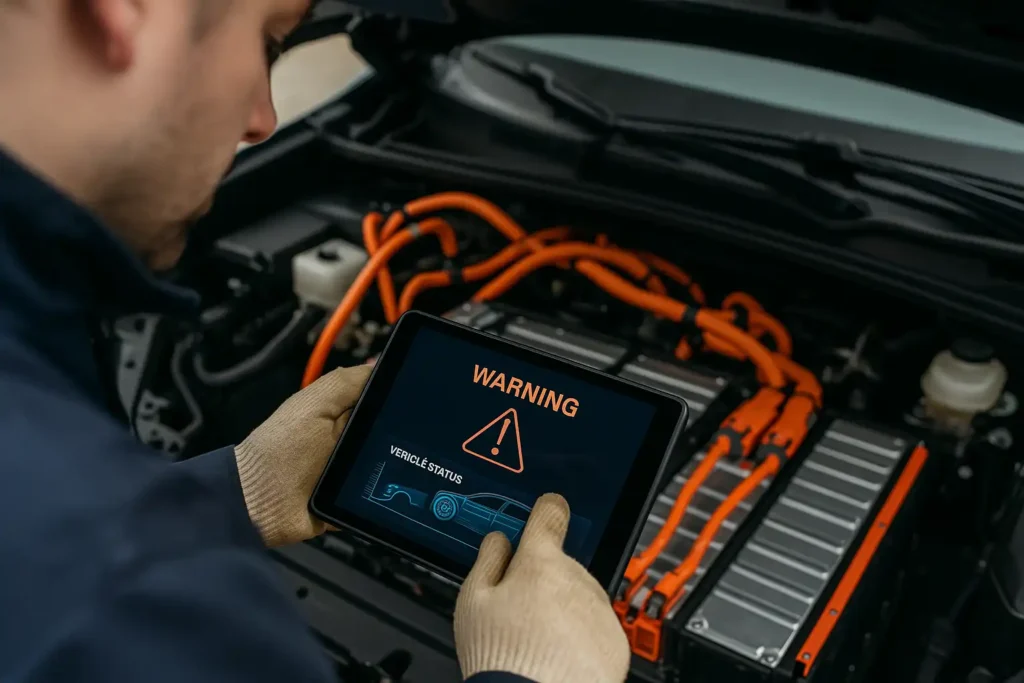California has become the heart of America’s electric vehicle revolution, leading with sustainability, innovation, and state-backed incentives. However, as thousands of new EVs hit the road each month, a growing number of drivers are discovering the hidden cost of early adoption: battery degradation, software errors, and charging malfunctions. The good news is that California EV Lemon Law battery and software defects applies equally to electric cars — giving consumers powerful legal tools to hold manufacturers accountable.
The Surge in EV Lemon Law Cases
Electric vehicles were once hailed as nearly maintenance-free, but in 2025, California attorneys are reporting a significant rise in EV Lemon Law claims. Commonly affected models include the Tesla Model Y and Model 3, Ford Mustang Mach-E, Rivian R1T, and Hyundai Ioniq 5. Many of these vehicles suffer recurring problems such as charging interruptions, reduced range, or system errors that render them undrivable.
According to the California Air Resources Board, electric vehicle complaints have doubled since 2022, especially those involving battery warranty repairs and faulty software updates. This trend has made it more important than ever for drivers to know how California’s Lemon Law protects them.
Understanding the California EV Lemon Law
California’s Song-Beverly Consumer Warranty Act (better known as the Lemon Law) requires manufacturers to replace or repurchase a vehicle that cannot be repaired after a reasonable number of attempts. The same applies to EVs experiencing repeated technical or software-related issues that affect use, value, or safety.
For electric vehicles, qualifying defects often include:
- Battery charging failures or range inconsistencies
- Overheating issues with high-voltage systems
- Malfunctioning touchscreens, sensors, or autopilot systems
- Defective regenerative braking or inverter components
- Software updates that worsen vehicle performance
How Many Repairs Qualify Your EV as a Lemon?

California generally requires three to four unsuccessful repair attempts for the same problem, or the car being out of service for more than 30 days. Because EV parts and batteries often take weeks to source, many cases easily cross the 30-day threshold.
Even minor-seeming issues can qualify if they affect safety or drivability — for example, a malfunctioning traction battery that causes sudden loss of power while driving.
Why Software Glitches Are the New Lemon Law Frontier
Unlike gas vehicles, EVs depend heavily on complex software ecosystems. Updates are frequently deployed over-the-air (OTA), allowing manufacturers to patch problems remotely. However, these updates sometimes introduce new defects, such as locked screens, disabled cameras, or braking irregularities. Proving these malfunctions under the Lemon Law requires careful documentation.
For instance, one Tesla owner in Los Angeles filed a Lemon Law claim after a firmware update caused repeated autopilot disengagements and battery calibration errors. After five failed repairs and weeks without his car, he successfully obtained a full vehicle repurchase under the Lemon Law.
California AB 1755: Stronger Consumer Protections in 2025
Under Assembly Bill 1755, effective January 2025, EV Lemon Law procedures are stricter but more transparent. The new law shortens deadlines for filing claims and introduces mandatory manufacturer response periods. Consumers must notify the automaker at least 30 days before filing a lawsuit, ensuring faster resolutions and clearer accountability.
These updates were designed to address the growing backlog of EV cases, many delayed by long part-replacement times and remote diagnostic disputes.
Filing an EV Lemon Law Claim in California
Filing a successful Lemon Law claim for an electric car requires detailed record-keeping and timing. Here’s how to do it effectively:
- Keep Service Records: Maintain digital and printed copies of all service visits, update logs, and dealer communications.
- Track Downtime: Count all days your vehicle was unavailable — including weekends and delivery delays.
- Send Written Notice: Mail a certified letter to the manufacturer at least 30 days before filing a claim.
- Consult an Attorney: A specialized California Lemon Law attorney can guide you through filing deadlines and evidence preparation.
Compensation You Can Receive
Qualifying under the EV Lemon Law can entitle you to:
- Full vehicle buyback (including taxes, fees, and interest)
- Replacement vehicle of comparable value
- Reimbursement for rental cars or towing
- Attorney’s fees — covered by the manufacturer
These remedies are especially vital for EV owners, as replacement batteries can cost over $15,000 and take months to deliver.
Recent EV Lemon Law Case Studies
In 2025, a class-action settlement was filed against a major automaker for repeated software crashes in electric SUVs that disabled braking assistance. In another case, a Rivian R1S owner obtained a full refund after months of battery overheating issues that left the vehicle stranded during summer highway travel.
These cases show how courts increasingly treat software bugs as “mechanical defects” when they impact safety or performance.
Manufacturer Responses to Lemon Law Claims
Some EV manufacturers are taking proactive steps to reduce legal exposure. Tesla has expanded its remote diagnostics program, while Ford and GM now use digital tracking systems to flag repeated warranty repairs. However, these systems can also be used to challenge claims, making legal representation even more important.
Consumers who rely solely on automated updates without written repair attempts may struggle to meet the Lemon Law’s proof requirements — another reason to involve a qualified attorney early.
How to Avoid EV Lemon Law Problems
- Test all core systems (charging, infotainment, autopilot) during the first 30 days of ownership.
- Install manufacturer updates promptly but keep screenshots or receipts.
- Use an at-home EV charger compatible with your model to avoid warranty disputes.
- Document any unusual noises, warning lights, or changes in performance.
Early detection and documentation can often resolve defects without legal escalation.
Why Work With an EV Lemon Law Attorney
EV Lemon Law cases demand both legal and technical expertise. An experienced attorney can coordinate expert inspections, obtain diagnostic reports from dealerships, and negotiate buybacks directly with the manufacturer. Because the law allows for recovery of attorney’s fees, most firms represent clients at no upfront cost.
At Lemon Law Lawyer Advice, our team specializes in complex EV cases across California, from Los Angeles to Sacramento. We’ve helped hundreds of clients recover compensation for vehicles with persistent battery, charging, and software issues.
Final Thoughts
The rise of electric mobility brings new challenges for consumers — but also new legal safeguards. If your electric car spends weeks in the shop, suffers from software failures, or loses significant range despite multiple repairs, you may have a valid claim under California’s Lemon Law. Don’t wait until your warranty expires. Contact Lemon Law Lawyer Advice today for a free consultation. Protect your investment, your time, and your peace of mind — because even the most advanced technology must be held accountable.
